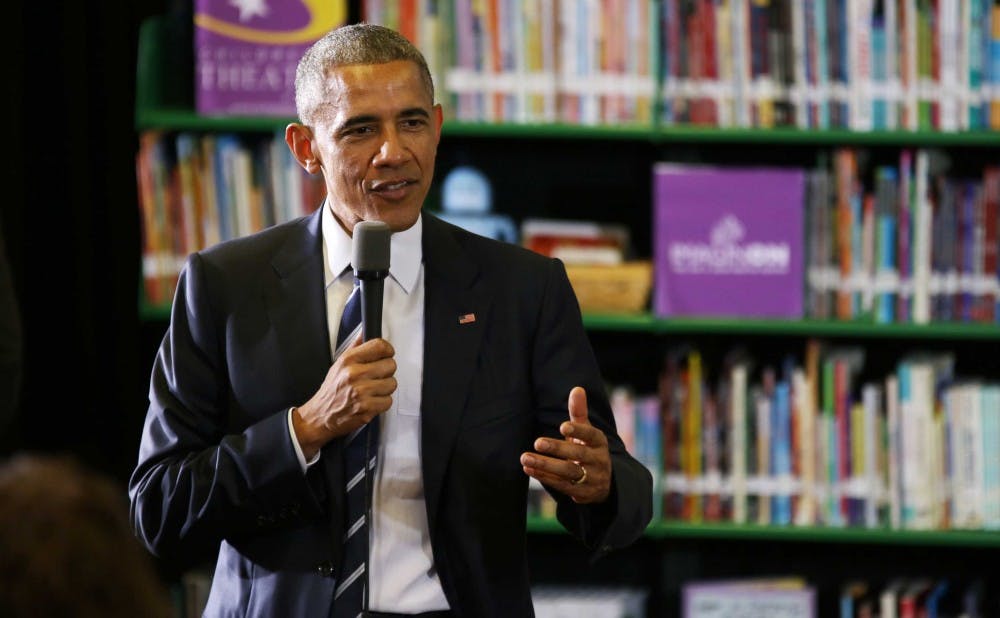CHARLOTTE, N.C.—President Barack Obama held a private town-hall discussion addressing obstacles facing working-class families and women at a local children's library Wednesday afternoon.
The wage gap between women and men and equal access to education and healthcare were the primary topics discussed at the talk, which took place at ImaginOn, an educational library and children's theater. In addition to presenting his own opinions, Obama responded to questions submitted by users of two blogs with large followings in the Charlotte area—BlogHer and SheKnows.
Despite its trouble passing through Congress, Obama lauded the controversial Paycheck Fairness Act because of its capacity to address income disparity between men and women. This proposal would make it legal for employees to share compensation data in an effort to better inform employees who suspect they may have been discriminated against.
"When women succeed here in America then the whole country succeeds," Obama said.
To illustrate his personal connection to the gender wage gap, Obama discussed his experiences watching his grandmother navigate challenges of being a female income earner. Despite being the primary wage-earner in his family, he said she was compensated unfairly compared to men in similar positions, one of the many anecdotes he used to inspire the crowd during the discussion about wage inequality. He then transitioned from discussion of past wage discrimination to modern economic challenges that must be addressed by referencing his two teenage daughters.
“I’ve got two daughters, I expect them to be treated the same as somebody’s sons who are on the job,” he said.
The conversation about equality of women in the workforce resonated with many in the audience of approximately 200, including Deidre Coleman, a Charlotte mother of a four-year-old girl.
“Hopefully by the time [my daughter] is out in the world, everything will come to fruition and she will be able to get equal pay for her equal education," she said.
One of the main challenges Obama acknowledged regarding equal wages was the lack of representation of women in Science, Technology, Engineering and Math—commonly known as STEM—careers. He cited better access to educational opportunities as one way of overcoming the issue.
Obama noted that access to early childhood education could expose students to STEM fields from a young age. However, he pointed out that the average cost of childcare in North Carolina is $16,000 per year, which can mean access to quality care is cost-prohibitive for many families. When students do not have access to early childhood education, they are already entering elementary school at a disadvantage, he said. One of his goals is to reform the current tax code to give more families access to early childhood education, despite skeptics that doubt how realistic such initiatives would be given current federal budget constraints.
“We know [education] is the smartest investment we can make as a society,” Obama said. “People say, well that’d be nice if we could afford it. But the truth is if we closed a few corporate tax loopholes that are not contributing to the economy right now, then we could afford it.”
Issues related to the cost of higher education also arose during the discussion, with Obama pointing to the availability of online learning options, improvement of loan counseling prior to borrowing and better academic support systems as potential initiatives to address increasing costs. He highlighted the state’s historic emphasis on higher education and called on legislators to renew that focus.
"North Carolina did better economically than other parts of the mid-Atlantic and Southeast because of the Research Triangle and emphasis on education," Obama said.
The passage of the Affordable Care Act—which mandated large employers to offer health insurance to their employees—was another positive Obama cited when the topic of discussion shifted to healthcare. He lauded Microsoft for refusing to collaborate with companies that don’t offer paid sick leave for their employees while acknowledging the future progress needed in that area of economic policy as well.
“Healthcare should be a right, not a privilege, in this country,” he said.
Even for those who work in more affluent industries that provide more robust benefits, Wednesday's discussion showed that policymakers and businesses still have more work to do. Among them was Christine Nelson, a public defender who attended the event.
“In terms of empowering women, even in the legal field where it’s a male dominated field, it's important that people are working for us to make sure that we’re seen as equals,” she said.
Get The Chronicle straight to your inbox
Signup for our weekly newsletter. Cancel at any time.

